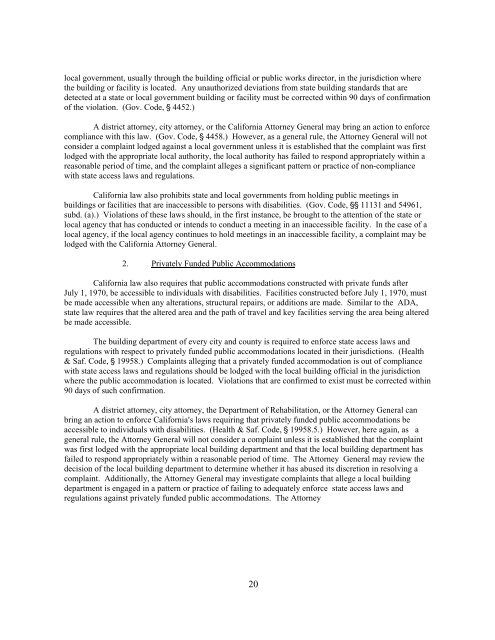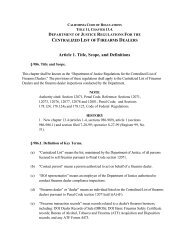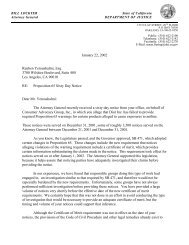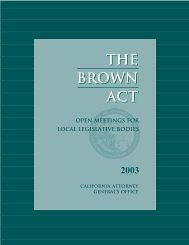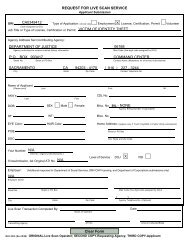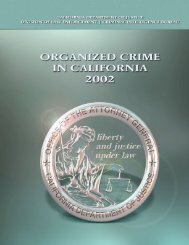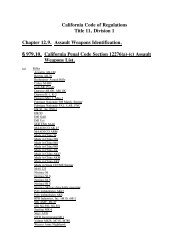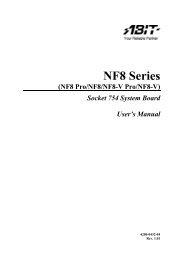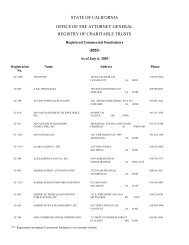Legal Rights of Persons With Disabilities - Ossh.com
Legal Rights of Persons With Disabilities - Ossh.com
Legal Rights of Persons With Disabilities - Ossh.com
You also want an ePaper? Increase the reach of your titles
YUMPU automatically turns print PDFs into web optimized ePapers that Google loves.
local government, usually through the building <strong>of</strong>ficial or public works director, in the jurisdiction where<br />
the building or facility is located. Any unauthorized deviations from state building standards that are<br />
detected at a state or local government building or facility must be corrected within 90 days <strong>of</strong> confirmation<br />
<strong>of</strong> the violation. (Gov. Code, ' 4452.)<br />
A district attorney, city attorney, or the California Attorney General may bring an action to enforce<br />
<strong>com</strong>pliance with this law. (Gov. Code, ' 4458.) However, as a general rule, the Attorney General will not<br />
consider a <strong>com</strong>plaint lodged against a local government unless it is established that the <strong>com</strong>plaint was first<br />
lodged with the appropriate local authority, the local authority has failed to respond appropriately within a<br />
reasonable period <strong>of</strong> time, and the <strong>com</strong>plaint alleges a significant pattern or practice <strong>of</strong> non-<strong>com</strong>pliance<br />
with state access laws and regulations.<br />
California law also prohibits state and local governments from holding public meetings in<br />
buildings or facilities that are inaccessible to persons with disabilities. (Gov. Code, '' 11131 and 54961,<br />
subd. (a).) Violations <strong>of</strong> these laws should, in the first instance, be brought to the attention <strong>of</strong> the state or<br />
local agency that has conducted or intends to conduct a meeting in an inaccessible facility. In the case <strong>of</strong> a<br />
local agency, if the local agency continues to hold meetings in an inaccessible facility, a <strong>com</strong>plaint may be<br />
lodged with the California Attorney General.<br />
2. Privately Funded Public Ac<strong>com</strong>modations<br />
California law also requires that public ac<strong>com</strong>modations constructed with private funds after<br />
July 1, 1970, be accessible to individuals with disabilities. Facilities constructed before July 1, 1970, must<br />
be made accessible when any alterations, structural repairs, or additions are made. Similar to the ADA,<br />
state law requires that the altered area and the path <strong>of</strong> travel and key facilities serving the area being altered<br />
be made accessible.<br />
The building department <strong>of</strong> every city and county is required to enforce state access laws and<br />
regulations with respect to privately funded public ac<strong>com</strong>modations located in their jurisdictions. (Health<br />
& Saf. Code, ' 19958.) Complaints alleging that a privately funded ac<strong>com</strong>modation is out <strong>of</strong> <strong>com</strong>pliance<br />
with state access laws and regulations should be lodged with the local building <strong>of</strong>ficial in the jurisdiction<br />
where the public ac<strong>com</strong>modation is located. Violations that are confirmed to exist must be corrected within<br />
90 days <strong>of</strong> such confirmation.<br />
A district attorney, city attorney, the Department <strong>of</strong> Rehabilitation, or the Attorney General can<br />
bring an action to enforce California=s laws requiring that privately funded public ac<strong>com</strong>modations be<br />
accessible to individuals with disabilities. (Health & Saf. Code, ' 19958.5.) However, here again, as a<br />
general rule, the Attorney General will not consider a <strong>com</strong>plaint unless it is established that the <strong>com</strong>plaint<br />
was first lodged with the appropriate local building department and that the local building department has<br />
failed to respond appropriately within a reasonable period <strong>of</strong> time. The Attorney General may review the<br />
decision <strong>of</strong> the local building department to determine whether it has abused its discretion in resolving a<br />
<strong>com</strong>plaint. Additionally, the Attorney General may investigate <strong>com</strong>plaints that allege a local building<br />
department is engaged in a pattern or practice <strong>of</strong> failing to adequately enforce state access laws and<br />
regulations against privately funded public ac<strong>com</strong>modations. The Attorney<br />
20


